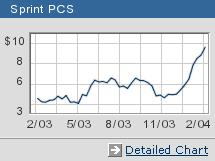
NEW YORK (CNN/Money) -
While it's tempting to say that the merger of Cingular and AT&T Wireless is bad news for consumers, that probably won't be the case.
And for that reason, this deal won't make the wireless sector any more compelling for investors -- competition will likely remain fierce, and continue to weigh on companies' financial results.
Now that consumers can switch carriers and take their numbers with them, pricing is more important than ever.
And it may be even more important once the Cingular-AT&T Wireless merger is completed -- the bigger and stronger Cingular could try to win over even more customers by slashing prices.
| Related stories
|

|
|
|
|
In case there was any confusion about which carrier the new Cingular specifically has its sights set on, AT&T Wireless CEO John Zeglis added the following piece of trash talk during a conference call Tuesday: "Hey Verizon, can you hear us now?"
Verizon Wireless, currently No. 1 in the business, will fall to No. 2 once the AT&T Wireless-Cingular deal closes.
Less competition? Really?
If Vodafone won the bidding war for AT&T Wireless, the number of major national carriers would have remained at six, giving investors even less reason to expect pricing to become more rational.
Still, it's hard to imagine a more sane pricing environment just because there will be only five major carriers.

| |
|
Sprint PCS has surged on speculation that it will be the next wireless carrier to be taken over.
|
|
"Fifteen years ago it only took three long distance providers to drive down rates," notes Barry Randall, manager of the First American Technology fund, referring to the emergence of Sprint and MCI to compete with AT&T.
What's more, the notion that Cingular-AT&T Wireless is creating an environment with fewer competitors is not really accurate. Albert Lin, an analyst with American Technology Research, said that there are other emerging threats, such as the rapidly growing Virgin Mobile, a pay as you go wireless service (i.e. no contracts) that's being marketed to teens.
So even more consolidation is probably needed. But can that happen?
More deals needed but not likely soon
In bidding for AT&T Wireless, Vodafone, which owns 45 percent of Verizon Wireless, clearly showed that it was very willing to exit that joint venture in order to gain full control of another wireless carrier. Scott Cleland, chief executive officer of Precursor, an independent research firm that focuses on telecom, described the Vodafone/Verizon Wireless partnership as a "loveless marriage."
| Recently in Tech Biz
|

|
|
|
|
But it will be difficult for Vodafone to find another carrier that would mesh as well as AT&T Wireless would have.
Sprint PCS, like Verizon, operates its network on the code division multiple access (CDMA) standard. So that would not be a natural fit for Vodafone to own since its European wireless business runs on the global system for mobile communications (GSM) standard. Cingular and AT&T Wireless also run on GSM networks.
Nextel? The company, with its walkie-talkie like phone service, has its own standard. Plus, the stock has been on a tear as of late and with a market value of $31.5 billion, it's hard to imagine Vodafone being able to pay the necessary premium for it. After all, Vodafone pulled the plug on its AT&T Wireless bid once the price tag grew north of $40 billion.
T-Mobile? It also runs on GSM, making it a more likely target for Vodafone. But Vodafone has had an acrimonious relationship with T-Mobile's parent company, Germany's Deutsche Telekom.
More consolidation may eventually happen but don't expect it anytime soon. Kevin Calabrese, an analyst with Argus Research, said that he doesn't see another major wireless merger taking place for at least another year. Nonetheless, shares of Sprint PCS, Nextel and Deutsche Telekom all surged more than 5 percent Tuesday morning.
If anything, Calabrese said that it's more likely for smaller regional carriers like Western Wireless and Dobson Communications to either get bought or merge with each other. Curiously, these two stocks were only up slightly Tuesday.
And Rick Black, an analyst with Blaylock & Partners, said Alltel, the nation's seventh largest wireless carrier, could make a play for Sprint PCS. But he doesn't see that happening for at least a year or two. And such a deal wouldn't do much to alleviate price competition either since it would essentially vault Alltel to major carrier status.
Lin argues that it will take two or three years for Cingular and AT&T Wireless to fully integrate their merger, which the companies hope to close by the fourth quarter. By that point, the landscape will already have changed...and competition will remain fierce.
"By the time we get to 2006 or 2007, there will be a ton of new service providers offering wireless voice and data," said Lin. "It's too late to think about the number of carriers shrinking. Five years from now we'll be looking at another wave of consolidation."
It looks like the more things change in wireless, the more they stay the same.
Analysts quoted in this piece do not own shares of the companies mentioned. Blaylock & Partners has done investment banking for Nextel and Verizon but none of the other firms have banking ties to companies mentioned in this story.
Sign up to receive the Tech Investor column by e-mail.
Plus, see more tech commentary and get the latest tech news.

|

